Suivi et évaluation
La plupart des défis liés au suivi et à l’évaluation, comme la quantité insuffisante d’investissements et le manque de capacités, ne sont pas spécifiques à l’assistance monétaire, mais ceux qui le sont concernent principalement le suivi des résultats des transferts non affectés. La flexibilité des transferts monétaires peut compliquer la définition d’indicateurs de résultats appropriés, qui pourraient impliquer un mélange d’indicateurs spécifiques au secteur et transversaux. En parallèle, il existe des limitations au moment de collecter des données précises sur la manière dont les transferts monétaires sont dépensés.
Les signataires du Grand Bargain se sont engagés à garantir que des mécanismes de suivi et d’évaluation pertinents des transferts monétaires soient en place, et à assurer une meilleure compréhension des coûts, avantages, impacts et risques de cette modalité par rapport à d’autres. En partant de cet engagement, le chantier du Grand Bargain sur les transferts monétaires a établi plusieurs points d’action, dont le développement d’indicateurs de résultats communs pour les transferts monétaires à usages multiples, et des indicateurs pour l’analyse de l’optimisation des ressources. L’analyse systématique de l’optimisation des ressources a été rendue difficile par plusieurs facteurs, dont un manque d’approches approuvées, le besoin en données sur les résultats en termes de qualité et le caractère intensif de l’analyse.
Priorités actuelles
Dans le cadre des engagements du chantier du Grand Bargain sur les transferts monétaires, le CALP Network a co-dirigé (avec l’USAID et CRS) la mise au point d’indicateurs de résultats des transferts monétaires à usages multiples. Le projet à tester est actuellement disponible en anglais, espagnol et français, via la bibliothèque.
Initiatives associées
Contenu présenté

Indicateurs de résultats des transferts monétaires à usages multiples : Projet final à tester
Guides et outils
Les indicateurs présentés dans ce document se concentrent sur les principaux objectifs des TMUM humanitaires et sur les résultats auxquels les transferts monétaires à usages multiples peuvent le plus fortement contribuer. (Par exemple, certaines interventions en TMUM visent à relier les personnes aux systèmes de protection sociale après la fin du TMUM; mais nous n’avons pas inclus...

Monitoring 4 CTP: Monitoring Guidance for CTP in Emergencies
Guidelines and Tools
This guidance provides a central resource to promote a common understanding of the most important monitoring considerations for humanitarian projects using cash transfer programming (CTP). The primary audience for this guidance is field-level practitioners, from organisations directly involved in the design, implementation, monitoring, and accountability of projects using cash and vouchers...

Cost-Efficiency Analysis of Basic Needs Programs: Best Practice Guidance for Humanitarian Agencies
Guidelines and Tools
The Efficiency, Effectiveness and Value for Money Sub-Workstream is pleased to share the final output on Cost-Efficiency Analysis of Basic Needs Programs: Best Practice Guidance for Humanitarian Agencies (attached).
Cost-efficiency analysis estimates the ratio of program costs to outputs created, allowing you to compare cost-per-output for programs which all produced the same output. Such...
Thematic lead
Contenu récent

Using Cash for Shelter: Rent Assistance for Syrian Refugees
Case Study
Over 600,000 Syrian refugees have arrived in Jordan since 2011; 80 percent of these live in urban or peri-urban locations rather than in camp settings. Families in this situation must pay rent for their shelter, and are therefore subject to shifts in rental market values. Rents have inflated substantially...
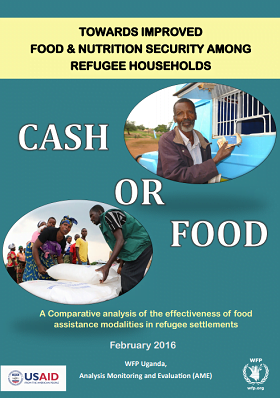
Cash or Food A Comparative analysis of the effectiveness of food assistance modalities in refugee settlements
Report
A comparative analysis on the effective of food and cash transfer modalities for household food security in refugee settlements in Uganda.

Recommandations clés pour assurer la protection dans le cadre d’interventions monétaires
Guides et outils
Recommandations clés pour assurer la protection dans le cadre d’interventions monétaires

Economic Impacts of Humanitarian Aid
Report
Humanitarian aid – whether in-kind or cash transfers – can have a significant economic impact. Potential positive effects include stimulating demand, supporting regeneration of local businesses, job creation and increased tax revenue for governments. Potential negative effects include price inflation,...
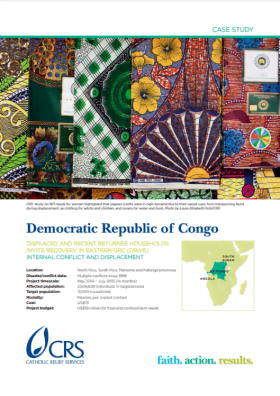
Using Cash for Shelter: Displaced and Recent Returnee Households Invite Recovery in Eastern DRC (DRIVE) Internal Conflict and Displacement
Case Study
The Democratic Republic of Congo, or DRC, has endured multiple conflicts since 1996, including armed conflict in Eastern DRC in 2012 and 2013. In December 2014, the United Nations Office for the Coordination of Humanitarian Affairs in the DRC reported that the armed conflict had internally displaced 2.72...
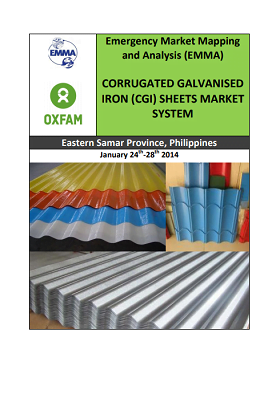
EMMA on CGI Sheets in Eastern Samar, Philippines
Report
Super Typhoon Haiyan (locally known as Yolanda) made landfall on the 8th of Nov’13 and left a trail of destruction along its path. It is estimated that 14 million people were affected and 4.1 million were displaced in the Philippines as a result of this super typhoon.Eastern Samar province of the...

The Impact of Earned and Windfall Cash Transfers on Livelihoods and Conservation in Sierra Leone
Report
This study by Bulte et al. measures the impact of a cash transfer programme aimed at alleviating poverty and reducing pressure on the natural environment in Sierra Leone. Researchers offered aid to 91 rural communities, which are dependent on slash-and-burn agriculture in three forms: as windfall...

Conseils pour assurer la protection dans le cadre des interventions monétaires
Guides et outils
Conseils pour assurer la protection dans le cadre des interventions monétaires

Impact Evaluation of the Multipurpose Cash Assistance Programme
Report
The Syrian crisis is currently in its sixth year, with over one million Syrians still living in Lebanon as refugees. Nearly 60% of all financial resources pledged by UN agencies and INGOs were to secure basic assistance for Syrian refugees, mainly to support them in meeting food and healthcare needs. In...
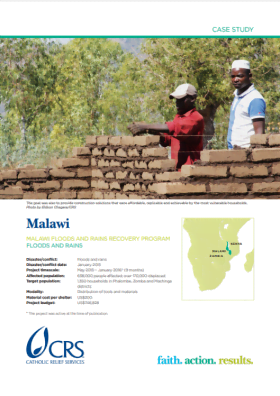
Using Cash for Shelter: Malawi Floods and Rains Recovery Program
Case Study
In January 2015, heavy rainstorms and floods affected 630,000 people in Malawi. Protracted immersion or flow of water damaged or destroyed dwellings and displaced over 170,000 people, with timber and roofing material also lost to the floods. Catholic Relief Services conducted a physical survey of...

Cash transfers programming in the Pacific: A Feasibility Scoping Study
Report
The use of Cash Transfer Programming (CTP) to provide humanitarian assistance so that people may access the goods and services they need before, during and following a crisis has been gaining momentum over the past decade. Despite the considerable use of cash and vouchers by government and non-state...

International Cash based assistance
Report
For more than 60 years, the United States provided assistance to food-insecure countries primarily in the form of food commodities procured in the United States and transported overseas. In recent years, the U.S.government has increasingly provided food assistance in the form of cash transfers or food...
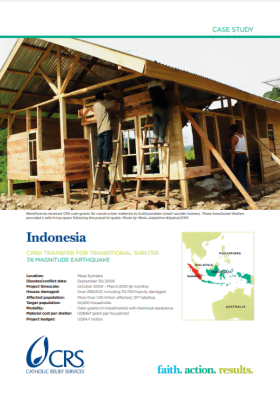
Using Cash for Shelter: Cash Transfer for Transitional Shelter
Case Study
An earthquake measuring 7.6 magnitude struck near the coast of West Sumatra, Indonesia, on September 30, 2009, affecting over 1.25 million people. Catholic Relief Services conducted rapid needs assessments in October 2009, identifying shelter as the most urgent need. Over 80 percent of the houses in some...

Cash and Markets In The WASH Sector
Report
Market based programming is increasingly heralded as having a critical place in the future of humanitarian programming. The proposed benefits of working through existing market systems include improvements to speed, efficiency and effectiveness of programming and increased beneficiary dignity and...

Economic Impact of Refugee settlements in Uganda
Report
Uganda is home to close to 800,000 refugees, mostly from South Sudan, Burundi and the Democratic Republic of Congo. It also has one of the most favorable and progressive refugee assistance programs in the world, with freedom of movement, work rights, and land officially set aside for refugees to...

Mobile Money Transfers – For Humanitarian Assistance & Development Programming: Service Provider Perspective
Report
This report summarizes findings from research on how digital payment services providers in Africa have worked with Non-Governmental Organization (NGO) customers to deliver digital payments to their program participants/beneficiaries in the context of providing humanitarian assistance and/or for...
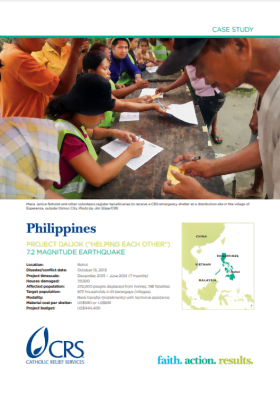
Using Cash for Shelter: Project Daijok ("Helping Each Other")
Case Study
After a major earthquake in the Philippines in October 2013, Catholic Relief Services reached 5,000 families with emergency shelter materials, water and hygiene kits, and emergency latrines. In November 2013, CRS staff conducted a housing and market assessment in three of the worst‑hit municipalities of...

Rapid Assessment for Markets: Bidibidi Refugee Settlement
Report
The Rapid Assessment of Markets (RAM) conducted within the Bidibidi Refugee Settlement and in the surrounding Ugandan towns and trading centres sheds some light upon the rapidly developing network of marketplaces within one of the world’s fastest growing refugee settlements. The RAM highligthed key...

Can E-transfers Promote Financial Inclusion in Emergencies: A Case Study from Bangladesh
Report
The Electronic Cash Transfer Learning Action Network (ELAN) launched research to build an evidence base around connecting emergency electronic transfer (e-transfer) recipients with additional financial services. They wanted to learn if, when, and how e-transfers can promote sustained uptake and use...

IOM Cash-Based Transfer – Update and Case Studies
Report
Cash-based transfers have a long history in the support of people on the move. Cash or vouchers have been an element of the International Organization for Migration’s resettlement support for people moving to new countries, or returning to countries they had to leave. Increasingly over the last decade,...
